Evenements
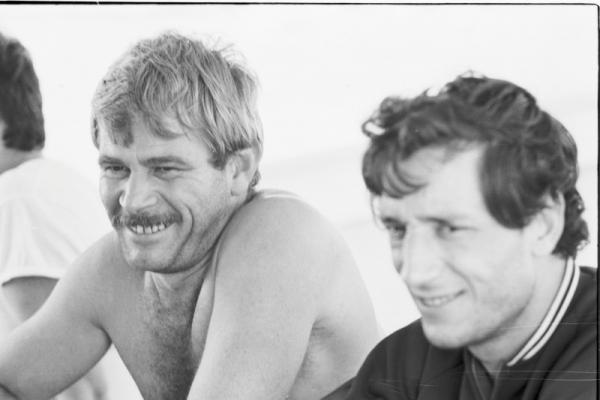
C'était Octave Léandri, technicien indispensable de l'Equipe Cousteau
Par Franck Machu.
Octave Léandri, que tout le monde nomme affectueusement Titi, rejoint l’équipe de la Calypso le 31 août 1951, alors qu’elle se prépare à sa première mission en mer Rouge. Il vient seconder le chef mécanicien René Montupet. C’est en mer Rouge au cours de cette première expédition qu’il débute la plongée sous-marine, au milieu des récifs majestueux. C’est aussi l’époque des vaches maigres, de l’aventure, où l’esprit de débrouillardise est fondamental. Titi se rend rapidement indispensable. Son rôle ne se limite pas à la bonne marche de la mécanique du bateau en mission, mais aussi aux innombrables périodes de travaux en chantier navals, où la Calypso prend peu à peu sa silhouette de navire océanographique.
Mission de recherche dans le Golfe persique
Au début de l’année 1954, Octave est de la mission géologique dans le Golfe Persique, à la recherche du pétrole d’Abu Dhabi. Il partage cette mission avec son jeune frère Maurice, embauché en tant que bosco. Maurice a un physique d’acteur de péplums et apparaît souvent à l’image. Octave est un homme discret qui ne se met que rarement dans le champ de l’objectif. Il faut un œil aiguisé pour l’apercevoir à la dérobé sur les photos ou les films.
La campagne dans le Golfe donne lieu à 400 stations de prélèvement d’échantillons, un travail de forçat des mers auquel aucun homme du bord n’échappe, dans une chaleur suffocante et des eaux peuplées de requins. Aucun équipement n’oubliera de tomber en panne et de leur donner du fil à retordre. La mission dure des mois sans presque aucune escale et met les organismes et le moral à rude épreuve. Au retour en France, une longue permission leur est accordée. Les frères Léandri ont définitivement gagné leurs galons de calypsoniens.

C'était André Laban, ingénieur de la soucoupe plongeante
Par Franck Machu.
André Laban, décédé à l’approche de ses 90 ans, fut un des personnages cléf de l’équipe Cousteau. Comme Frédéric Dumas ou Albert Falco, il joua un rôle essentiel. Conseil aiguisé, parole lucide, complice sans masque, il fut l’un des seconds de Cousteau dans les années d’intense créativité.
L'embarquement sur la Calypso
Tout commence en 1952, sur la plage arrière de la Calypso amarrée au Vieux Port de Marseille pour décharger les amphores fraichement remontées de l’épave antique du Grand Cougloué. Cousteau cherche un ingénieur pour prendre le relais de Jean de Wouters. André Laban vient de décrocher son diplôme d'ingénieur chimiste. Il est attiré par la plongée et l’univers sous-marin dévoilé par Cousteau dans ses premiers courts métrages. « Que sais-tu faire ? » lui demande Cousteau. « Rien, lui répond-il, mais je sais un peu bricoler ». Cousteau lui propose un essai d’une semaine… une semaine qui se prolongera 20 ans.
Laban est très vite affecté à l’Office Français de Recherche Sous-marines (OFRS) que Cousteau crée à Marseille en 1953, et imagine comme le pendant civil du GERS de la Marine nationale. Le premier défi est de concevoir un boitier sous-marin de caméra de télévision pour une émission en direct au court de l’année 1953.
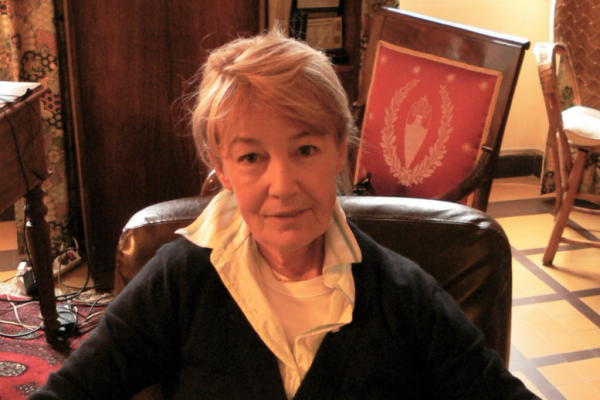
C'était Hedwige Bienvenu, la chef monteuse de Equipe Cousteau
Par Franck Machu.
Hedwige Bienvenu, décédée en avril 2018, fut la chef monteuse des films Cousteau. Elle fut précédée dans cette tâche par Georges Alépée et John Soh, mais su reprendre le flambeau avec maestria. Lorsque Jacques-Yves Cousteau est à Paris, les deux personnes avec lesquelles il passe le plus de temps à travailler sont Hedwige Bienvenu et Lise Coenca, sa secrétaire.
Les débuts avec Cousteau
Hedwige Bienvenu débute dans le cinéma en 1962, comme script. Elle apprend sur le tas et réalise des stages, puis passe au montage, où elle travaille pour Frédéric Rossiff, le fameux cinéaste animalier. Elle intervient pour la première fois chez Cousteau en 1971, au moment où il réalise les versions françaises des films sur les loutres, les pieuvres et les dauphins. Elle enregistre Philippe Diolé qui a effectué la traduction française des textes américains, donne son avis sur le ton, sur la durée des phrases, et réalise la part purement technique du montage voix-images-musique. Elle refuse pourtant d’entrer à ce moment-là dans l’équipe, et retourne au cinéma traditionnel, travaillant sur des films de long métrage avec Papatakis, Trintignant, Drach. Elle veut rester dans le long métrage et cherche sa voie.
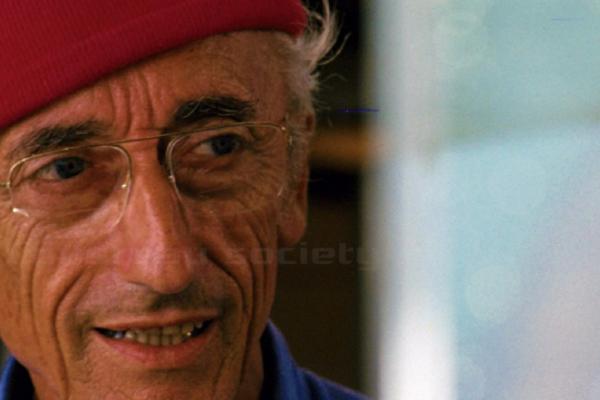
Jacques-Yves Cousteau 20 ans après, l’hommage de Francine Cousteau
20 ans !
Voici 20 ans le Commandant Cousteau partait explorer de nouveaux rivages.
Je veux lui rendre hommage et non pas marquer de cérémonies le jour le plus triste de ma vie.
Il y a 20 ans nos deux enfants adolescents voyaient disparaitre le magicien qui avait illuminé leur enfance et des millions de gens prenaient conscience qu’une longue absence s’installait. Un grand vide, un de ces moments qui laisse la Planète orpheline.
Pendant 20 ans, quelque soient les difficultés que nous ayons eu à traverser, l’Equipe Cousteau a construit patiemment un avenir à l’oeuvre de son fondateur Jacques Yves Cousteau.
J’ai eu le bonheur et la chance de vivre 20 ans à ses cotés et de partager sa vie y compris dans les épreuves les plus difficiles.
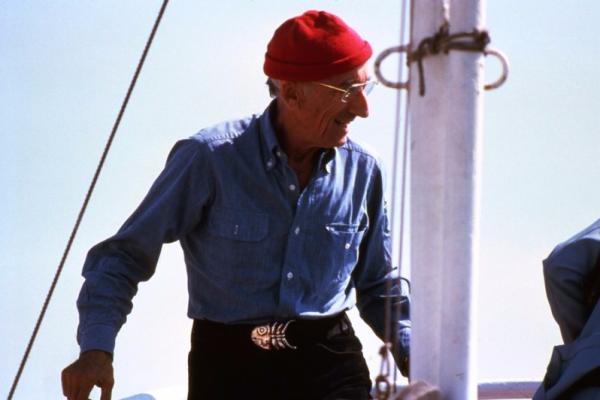
Anniversaire Cousteau: La nouvelle coque de Calypso est fermée! L’héritage de Cousteau vit encore…
Avec nos pensées les plus affectueuses, Joyeux anniversaire JYC.Paris, le 11 Juin.
Cher JYC,L’équipe Cousteau était à la Conférence des océans à New York pour défendre ta vision et ton travail, mais aussi en Turquie pour restaurer le Calypso.
Après 20 années difficiles sans toi, Calypso naviguera à nouveau, aujourd’hui sa coque est fermée. Après des temps torrides, nous avons maintenant ce qui ressemble de nouveau à un bateau et nous sommes tous tellement fiers d’avoir atteint cette étape.
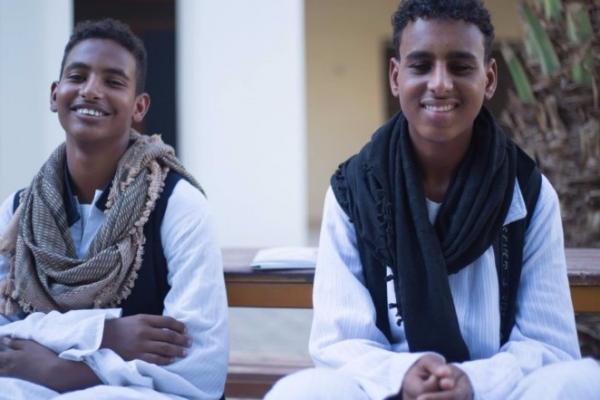
Journée Mondiale des Océans: Deux enfants soudanais joignent l’appel à la protection de l’océan à l’Assemblée générale des Nations Unies.
Deux jeunes soudanais prouvent que la cause environnementale peut dépasser les barrières politiques à l’Assemblée générale des Nations Unies.
New York, NY – Le 8 juin
Lors de la Journée Mondiale des Océans ce jeudi 08 Juin, deux enfants soudanais venant d’une petite communauté de pécheurs du bord de la Mer Rouge joignent leur voix à d’autres enfants de la Planète pour demander aux leaders mondiaux de sauver les océans pour les générations futures. Ce sont de jeunes ambassadeurs choisis par leur communauté se trouvant dans site déclaré le 17 juillet 2016 par l’Unesco au patrimoine mondial naturel marin pour sa « valeur universelle exceptionnelle ». Le site couvre une zone allant du parc national de Sanganeb à celui de Dungonab et de l’Île de Mukkawar. C’est le premier site à obtenir ce classement dans l’ensemble de la Mer Rouge.
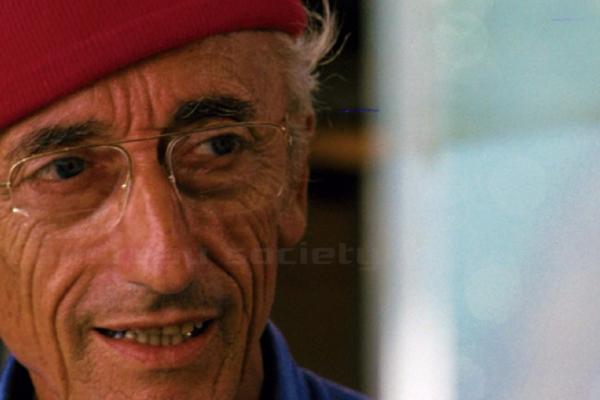
Jacques-Yves Cousteau 20 years later: Francine Cousteau’s homage
20 years!
Twenty years ago, Captain Cousteau set sail to explore new shores.
Today is not a time to mark a ceremony for what was the saddest day of my life, but instead to pay tribute to this wonderful man.
Twenty years ago our two teenage children saw their father, the magician who illuminated their childhood, disappear. That day millions of people realized that a long absence was taking hold, a great void, one of those moments that leaves the planet orphaned.
For twenty years, through the difficulties we have had no choice but to pull through, the Cousteau team patiently built a body of work aiming toward a future true to the travail of its founder Jacques-Yves Cousteau.
I had the joy and luck to spend 20 years by his side, sharing his life through it’s enchantments but also its most difficult tests.
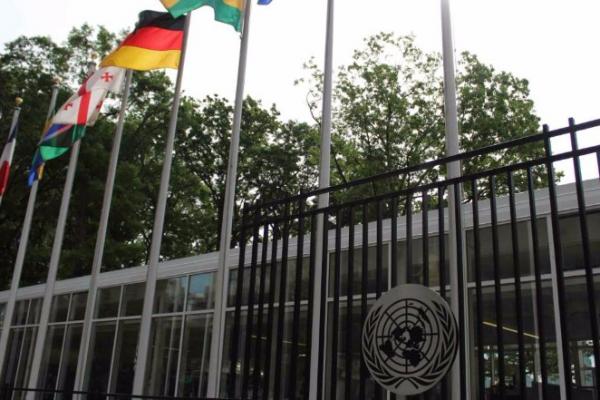
Prince Albert II of Monaco spurs #MyOceanPledge signature
On June 8th 2017, World Oceans Day, his Serene Highness Prince Albert II of Monaco was the first to sign #MyOceanPledge. The pledge was launched by children who come from over 12 UNESCO marine World Heritage Sites in front of 40 Heads of State during a high-level event at the United Nations General Assembly in New York, organized by the UNESCO World Heritage Marine Programme.

UNDP committed to ensuring Jacques-Yves Cousteau’s legacy lives on.
UNDP honour Jacques-Yves Cousteau’s memory and announce plans to work with the Cousteau Society to help achieve Sustainable Development Goal 14 (SDG 14), which aims to “Conserve and sustainably use the oceans, seas and marine resources for sustainable development“.
Full article on the UNDP website: Honouring the memory of Jacques Cousteau.
Follow The Cousteau Society:
Facebook @CousteauGlobal
Twitter @CousteauTCS
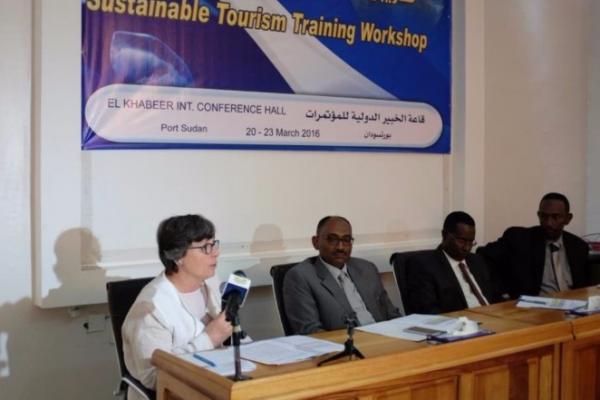
Could sustainable tourism promote the Marine Protected Areas of the Red Sea?
To answer this question, Cousteau supported a Training Workshop about Sustainable Tourism, which was held on March 20th-23rd 2016 at the El Khabeer International Conference Hall of The Red Sea University in Port Sudan, Red Sea State of Sudan.
The Red Sea was explored by Cousteau since in 1956, during the filming of “The Silent World” (Palme d’Or at the Cannes Film Festival; Oscar in Hollywood) and “World without Sun”. In the early 2004, the Cousteau vessel Alcyone anchored on the atoll of Shaab Rumi for an expedition in Sudan, which provided the opportunity to revisit sites where, 50 years earlier, Cousteau had passed through.
In 2007, Cousteau has gathered a multidisciplinary team of scientists to carry out the most comprehensive survey of the Sudanese coast and underwater environment ever to be attempted in this region. From there the Society have been supporting and promoting projetcs of sustainable development to follow the Cousteau’s legacy.
The workshop, as one of these projects, had its opening ceremony chaired by the Representative of the Wali and Minister of Ficance as well as by The Red Sea University Vice Chancellor and by The Red Sea University Faculty of Marine Science & Fisheries Dean. The Head of the Department of Biological Oceanography Faculty of Marine Sciences & Fisheries of Red Sea University was the master of ceremony.
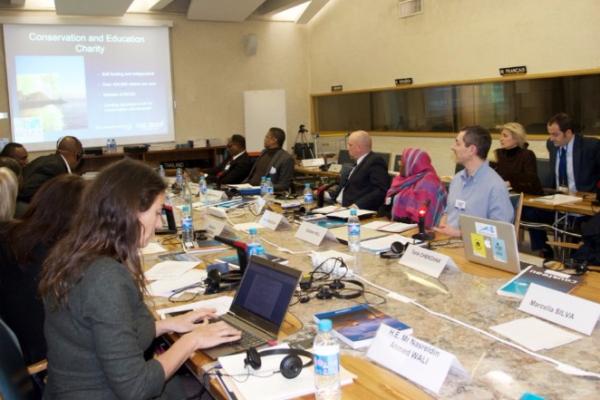
Unesco World Heritage Site : Cousteau supports the nomination process of the exeptional sites in the Red Sea coast of Sudan
On 25th February 2016, Cousteau and the Arab Regional Centre for World Heritage (Unesco) organised a meeting of experts convened at UNESCO Headquarters in Paris.
This meeting aimed at strengthening local management capacities and scientific partnership for two marine protected areas: Sanganeb Atoll and Dungonab Bay-Mukkawar Island. Another important goal was encouraging sustainable development and ecotourism to the benefit of local communities. Moreover, the concentration of charismatic species such as manta rays, sharks, dugongs, sea turtles and coral reef ecosystems is a remarkable support to develop ecostourism and to protect its unique marine life.
The meeting gathered a group of international and Sudanese experts representing the Sudanese Red Sea University, the Sudanese Wildlife Conservation General Administration, the Sudanese National Man and Biosphere (MAB) Committee, the Sudanese National Commission for UNESCO, the Regional Organization for the Conservation of the Red Sea & Gulf of Aden (PERSGA); the Sudanese NGO Sudia, The Deep Aquarium (UK), the University of Windsor (Canada) and the International Union for Conservation of Nature (IUCN).
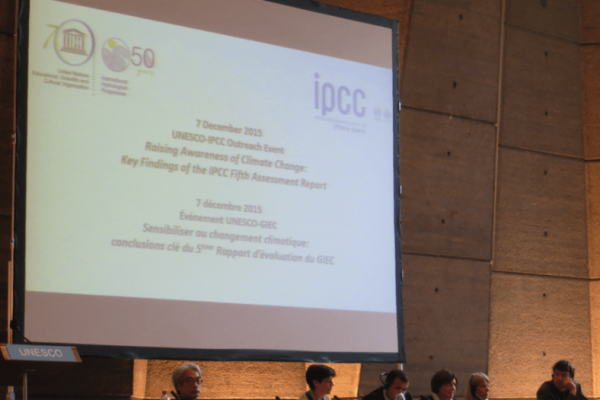
The Cousteau Society participated in the IPCC event hosted by UNESCO-IHP
During the COP21, IPCC and UNESCO-IHP promoted a side event to discuss the key findings of the 2014 Report on Climate Change with special session about Science and Policy dialogue and a seminar on education and climate change. The Cousteau Society was represented by Ms. Marcella Silva, Education and Communication Project Manager, who pointed out the question about the special report on ocean, in order to have the update of its current development. The Secretary of IPCC, Mr. Bruce Stewart responded saying that many countries already agree with its adoption, such themes have been discussed during the 41st IPCC session. He highlighted the importance of this report but added that for its establishment, IPCC demands more volunteer research from scientists, as a source of data.
What is the importance of an IPCC Ocean special report?
The IPCC (International Panel on Climate Change) is a scientific body under the auspices of the United Nations (UN). It reviews and assesses the most recent scientific, technical and socio-economic information produced worldwide relevant to providing a climate change report. The panel does not conduct any research nor does it monitor climate related data or parameters. Thousands of scientists from all over the world contribute to the work of the IPCC on a voluntary basis.
The authors producing the reports are currently grouped in three working groups – Working Group I: the Physical Science Basis; Working Group II: Impacts, Adaptation and Vulnerability; and Working Group III: Mitigation of Climate Change. The IPCC Fifth Assessment Report (AR5) which increased its focus on the oceans.
Because of its scientific and intergovernmental nature, the IPCC embodies a unique opportunity to provide rigorous and balanced scientific information to decision makers.
The Oceans have a essential role to regulate atmospheric conditions, to stabilize global temperature, and to provide food and resources to hundreds of millions of people throughout the world. It is however heavily influenced by the rapid rise of carbon dioxide and other greenhouse gases in the atmosphere, putting marine ecosystems, people, and industries at risk.
In the meeting in Nairobi in February 2015, Monaco presented a proposal for an IPCC special report on oceans, noting the multiple beneficiaries of such a report, including the UNFCCC, the Convention on Biological Diversity and the UN Convention on the Law of the Sea. Such a report would send a strong signal regarding the importance of oceans, and should address
regional aspects. Countries such as Peru, India, Malawi and Algeria supported by Madagascar, Chad, Egypt, Mali, Saudi Arabia, Jordan, Spain, the Philippines, Kuwait, added proposing a special report on the link between climate change and desertification.
Japan suggested specific themes that could be pursued, such as ocean acidification and sea-level rise, and highlighted the importance of education programmes on oceans, such as UNESCO-IHE Institute for Water Education and the World Climate Research Programme.
During the Ocean Forum day in COP21, the Environment Minister of France, Ms. Segolene Royal also supported the adoption of the Special Report on Ocean.
Looking forward to the COP22 in Marrakesh, the IPCC in April 2016 will have the opportunity to discuss the inclusion of a Special Report on the Ocean during the drafting period of the Evaluation Report on Climate Change AR6.
Source : IISD Reporting Services, IPCC